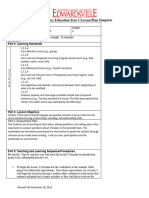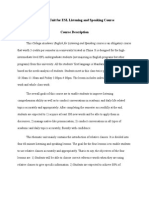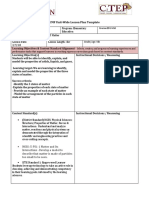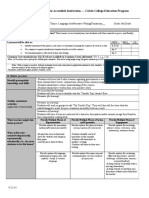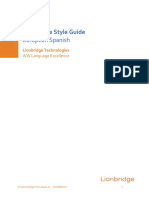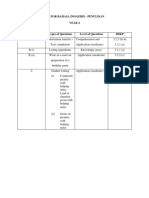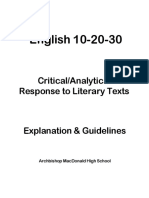0 ratings0% found this document useful (0 votes)
45 viewsChelseawalczak Lls
Chelseawalczak Lls
Uploaded by
api-242600774Copyright:
© All Rights Reserved
Available Formats
Download as DOCX, PDF, TXT or read online from Scribd
Chelseawalczak Lls
Chelseawalczak Lls
Uploaded by
api-2426007740 ratings0% found this document useful (0 votes)
45 views10 pagesOriginal Title
chelseawalczak lls
Copyright
© © All Rights Reserved
Available Formats
DOCX, PDF, TXT or read online from Scribd
Share this document
Did you find this document useful?
Is this content inappropriate?
Copyright:
© All Rights Reserved
Available Formats
Download as DOCX, PDF, TXT or read online from Scribd
Download as docx, pdf, or txt
0 ratings0% found this document useful (0 votes)
45 views10 pagesChelseawalczak Lls
Chelseawalczak Lls
Uploaded by
api-242600774Copyright:
© All Rights Reserved
Available Formats
Download as DOCX, PDF, TXT or read online from Scribd
Download as docx, pdf, or txt
You are on page 1of 10
Running Head: LINGUISTIC LESSON SERIES 1
Linguistic Lesson Series
Chelsea Walczak
LAE4332
Florida State University
LINGUISTIC LESSON SERIES 2
There, and Colons, and Commas, Oh My!
Grade: 10
Rationale:
Every other week on Friday, in anticipation of the FCAT Writes exam, this class of tenth
grade students will be given an FCAT prompt taken from previous years and they will have the
full class time to formulate their written response. The first week of school has passed and
students have turned in their first practice writes. Common errors in this first set have been
identified and taken into careful consideration for the series of grammar mini lessons outlined
below.
The most common errors found include, but are not limited to: homophone mix-ups,
weak transitional words and phrases, and general lack of punctuation. It is important to target
this issues early on so students are well-prepared and confident going into their FCAT exam, as
well as the numerous other occasions in their future that will require formal writing.
This grammar mini lesson series will take place over the course of five days. Every day,
students will be guided through short, writing activities which will help them contextualize what
they are learning. The first day will cover homophones, the second and third day will cover
transitional phrases, and the fourth and fifth day will cover punctuation. Students will receive a
five point participation grade each day, worth 25 points total. Students will also be saving all of
their writing pieces in a binder to build a portfolio. This portfolio will serve as formal/informal
assessment and show their progress. Students will pick their favorite piece and star it for grading.
All of these mini lessons will be taking place within a larger unit on genre theory.
Standards:
CCSS.ELA-LITERACY.L.9-10.1: Demonstrate command of the conventions of Standard
English grammar and usage when writing or speaking.
CCSS.ELA-LITERACY.L.9-10.2: Demonstrate command of the conventions of Standard
English capitalization, punctuation, and spelling when writing.
CCSS.ELA-LITERACY.L.9-10.2A: Use a semicolon (and perhaps a conjunctive adverb) to
link two or more closely related independent clauses.
CCSS.ELA-LITERACY.W.9-10.1D: Establish and maintain a formal style and objective tone
while attending to the norms and conventions of the discipline in which they are writing.
CCSS.ELA-LITERACY.W.9-10.2C: Use appropriate and varied transitions to link the major
sections of the text, create cohesion, and clarify the relationships among complex ideas and
concepts.
CCSS.ELA-LITERACY.W.9-10.10: Write routinely over extended time frames (time for
research, reflection, and revision) and shorter time frames (a single sitting or a day or two) for a
range of tasks, purposes, and audiences.
LINGUISTIC LESSON SERIES 3
Objectives:
Students will be able to
Define the terms homophone, transitional phrase, and colon
Describe and discuss what uses a comma has in a sentence
Generate original, grammatically correct sentences (specifically the proper use of
commas, strong transitions, and colons)
Fill in the blanks of already generated sentences to help recognize patterns
Participate in the discussion of image and song analogies for mechanics
Materials:
Computer, projector, whiteboard, handouts, writing utensil, paper, and binder.
Day 1: Homophones
Student error example: Normaly I tell people to go with there guts
Anticipatory Set: The most common homophone students mixed up in their papers was
there/theyre/their. Therefore, the first day of these grammar mini lessons will kick off with a
humorous, but informative YouTube video (https://www.youtube.com/watch?v=BzCbByE9qEs)
about these homophones. This video is only a minute long and the creator wrote sentences based
on adorable corgi pictures using the correct form of there/theyre/their.
Time Allowed Students Will Teacher Will
2 min- video -watch video -play video and take attendance as students
are watching
3 min- definition -respond to video
-identify other homophones
-ask any questions to clear
up confusion
-ask for video feedback
-What is the definition of a homophone?
-Have students name other examples aside
from there/theyre/their
10 min-
observation or
picture sentences
-listen to instructions
-pick one of the two activity
options and complete it in
10 min.
-explain writing activity: pick objects,
people, and places in the classroom and
write five appropriate sentences using the
homophones OR look up a photo on the
web (like the corgis) and use it as
inspiration
Day 2: Transitions
Student error example: My first reason for like reality television shows is
Anticipatory Set: While most students use weak transitional words like first or lastly, many
of them might not be familiar with the word transition. I would like to kick off this lesson by
showing the class images of road signs. I will ask them Why have these road signs? A student
should eventually chime in something along the lines of the signs help drivers know where to
LINGUISTIC LESSON SERIES 4
turn or what to do to which I will reply that writing transitional phrases does the same. These
phrases are the beginners to each paragraph and give direction to the reader.
Time Allowed Students Will Teacher Will
3 min- road signs -respond to road sign
questions
-ask questions about
transitions
-introduce topic with road signs, ask
students about similarities between the two
-list some examples of strong and weak
transition words
12 min- activity -listen to instructions and
work on chart individually
-ask teacher or classmates
for help if needed
-explain activity
-hand out chart worksheet (see appendix B)
Day 3: Transitions Part Two
Student error example: I like reality television shows for all three reasons I listed.
Anticipatory Set: Students have already begun working on transitional phrases, so they do not
need a full introduction. I will instead write a list of debate options up on the board for the
activity and explain its purpose.
Time Allowed Students Will Teacher Will
2 min- opener -listen to explanation and
instructions
-write debate topics on board
-explain that these will act as prompts
for writing transitional phrases
-elaborate that such phrases are extremely
useful in argumentative and persuasive
genres, good words can enhance the point
-instruct students to write at least three
sentences about a topic using transition
words from the sheet (appendix B)
13 min- debate
sentences
-compose sentences about a
pro/con argument using the
bank of transition words
-monitor student work
Day 4: Punctuation Part One
Student error example: by excepting something with out cross examining it could be full of
[?] you can handle so be careful because first impressions are unreliable.
Anticipatory Set: As mentioned in the rationale, a majority of students struggled with lack of
punctuation in their writing. The punctuation mark left out the most was the comma. Oftentimes,
the best way to engage students in the topic of grammar is through humor and so the fourth day
of this series will begin with two, humorous materials related to grammar. One is the well-known
image grammar saves lives -- the sentence lets eat grandma changed to the intended
meaning lets eat, grandma using a comma. The second is a short, satirical news article
LINGUISTIC LESSON SERIES 5
Commas, Turning Up, Everywhere (http://www.theonion.com/articles/commas-turning-up-
everywhere,6120/) featured on The Onion. The former focuses on lack of commas and the latter
reminds students that it is also just as bad to randomly scatter commas throughout a sentence.
Time Allowed Students Will Teacher Will
3 min- article and
picture
-read article and observe
image
-respond to both
-project image on one side of screen and
Onion article on the other (hand out paper
copies for visually impaired students)
-ask for questions and reactions
4 min- discussion
of commas
-volunteer to share ideas of
where commas should go
in a sentence
-listen to pneumonic
explanation
-call on students to brainstorm a list of
times we are required to use a comma
-write student responses on board
-review AAAWWUBBIS (subordinating
conjunctions)- introductory words that need
commas
8 min- activity -listen to instructions
-complete when I was
little and original
sentences
-use When I was little activity from
Mechanically Inclined (pg. 92)
-explain activity
-write at least three sentences using the
beginning when I was little and make sure
comma is present, then make up three
original opener, sentences which
demonstrate proper use of comma
Day 5: Punctuation Part Two
Student error example: Example last night I met this man we started talking one thing lead to
another nine months later he is know where to be found
Anticipatory Set: Many of the students gave examples in their papers to support their argument.
I am very pleased to see their attempt to include supporting points, however, it was often
presented in a grammatically incorrect way. The word example needs to be followed with a
colon. Additionally, there are numerous other ways to present lists/points other than example
like e.g. or i.e. I have chosen to play the Grammar Girl E.g. Versus I.e. podcast
(http://www.quickanddirtytips.com/education/grammar/ie-versus-eg) as an opener to this final
lesson to get the conversation rolling about these sentences starters.
Time Allowed Students Will Teacher Will
5 min- podcast -listen to the podcast
-note any questions or
comments
-play podcast
-take attendance
10 min- song and
the colon
-listen to the song
-guess what the song could
mean and give own
definition of the colon
-participate in writing
-use The Colon lesson taken from
Mechanically Inclined (pg. 152)
-play portion of Anticipation song by
Carly Simon
-call on volunteers for guesses
LINGUISTIC LESSON SERIES 6
activity, complete the
birthday sentence at least
three times and three
original sentences
-explain how the song relates to the colon
(anticipating a list or elaboration)
-instructions for finish the sentence activity:
Students will begin with So many things
ruined/made my birthday: ________, fill in
the blank three times and then create three
original sentences demonstrating
understanding of the colon
Homework/Follow Up: Students will not have any homework during this series of lessons.
After every grammar mini lesson, the rest of the period will be spent going into further detail and
discussion of various writing genres. E.g. after the lessons on transitions, students will also learn
about introductions, conclusions, and how to best format writing in the business genre (cover
letters, permission letters etc.)
Assessment: Formal- Students will turn in their binder of writing that has been done over the
course of the week. Their favorite piece will be starred and this will be the one graded according
to the rubric. Students will also receive 5 points participation credit for every day they are
present in class and actively participating. Informal- The writings in the binder that are not
starred will act as an informal assessment and allow me to analyze student progress throughout
this series. I will also be asking for feedback on which supplementary materials (videos,
podcasts, and handouts) were the most appealing to this grade level and/or which ones were the
most helpful in learning about grammar.
Accommodations: Physically disabled students will be seated in an easily accessible area of the
classroom and the desks will be arranged in a spacious way that allows for movement of the
wheelchair. Visually disabled students will be seated close to the projection screen and all
handouts will be printed in at least an 18 point font. Additionally, some materials that have been
chosen have audio in addition to visual displays, allowing these students to listen to, rather than
watch the lesson. ADHD students will be allowed to listen to music through headphones during
independent work time if it helps them to focus. They will also be seated in an area of the
classroom away from distracting objects and classmates. ELLs will be seated next to native
English speakers who have agreed to assist the ELL during these lessons and provide extra
explanation. ELLs will also be given a dictionary and their handouts in their L1 depending on
their fluency level. GT students will be allowed to ask for additional work or grammar to add to
their writing if they need more of a challenge. Contrarily, lower level readers and ELLs can
have their assignments modified if they are struggling to keep up with the rest of the class. They
will also have time to conference with me during independent work time. Additional time will be
given if students wish to put more detail and attention into writing.
Citations:
Grammar Girl. (2011). I.e. versus e.g. [podcast]. Retrieved from
http://www.quickanddirtytips.com/education/grammar/ie-versus-eg.
LINGUISTIC LESSON SERIES 7
Rogers, G. (2011). Comma comic [image]. Retrieved from http://writing-rag.com/624/time-for-a-
comma-comic/.
Sarahsaurus Rex. (2013). STOP! Its grammar time: There, their, and theyre with corgis
[video]. Retrieved from https://www.youtube.com/watch?v=BzCbByE9qEs.
Simon, C. (2009). Carly Simon- Anticipation [video]. Retrieved from
https://www.youtube.com/watch?v=4NwP3wes4M8.
Teacher Vision. (n.d.) Transition words and phrases. Retrieved from
https://www.teachervision.com/writing-composition/vocabulary/1780.html.
Visual Thesaurus. (2012). Transition words and phrases: Road signs for the reader. Retrieved
from http://www.visualthesaurus.com/cm/lessons/transition-words-and-phrases-road-
signs-for-the-reader/.
See appendix for rubrics and worksheets.
Resources:
Anderson, J. (2005). Mechanically inclined. Maine: Stenhouse Publishers.
Common Core State Standards Initiative. (2014). English language arts standards. Retrieved
from http://www.corestandards.org/ELA-Literacy/L/9-10/.
Florida Department of Education. (2013). 2013 FCAT 2.0 writes. Retrieved from
http://fcat.fldoe.org/fcat2/pdf/13fcat2writing.pdf.
n.a. (n.d.). Student example one. Retrieved from
http://fsuenglished.ning.com/assignments/linguistic-lesson-series.
n.a. (n.d.). Student example two. Retrieved from
http://fsuenglished.ning.com/assignments/linguistic-lesson-series.
Ruzich, C. & Perkins, M. (n.d.) The passion of punctuation. Retrieved from
http://www.readwritethink.org/classroom-resources/lesson-plans/passion-punctuation-
30809.html?tab=4#tabs.
LINGUISTIC LESSON SERIES 8
Appendix A
Rubric 1 (Picture Sentences):
A minimum of five sentences (5 pts)
Correct use of there, theyre, and their (5 pts)
______/10 total
Rubric 2 (Worksheet):
Chart is filled out correctly (13 pts. = 1 pt for each square)
Sentence at the bottom incorporates at least two of the transitional words from the bank
(2 pts)
_____/15 total
Rubric 3 (Debate Sentences):
Student has chosen one of the debate topics provided (1 pt)
At least three transitional sentences are written using words provided (9 pts = 3 pts each)
____/10 total
Rubric 4 (When I was little):
The three When I was little sentences have been completed (3 pts)
An additional three sentences are written using the same format (3 pts)
There is a comma correctly placed in the additional sentences (3 pts)
_____/9 total
Rubric 5 (Birthday):
The three birthday sentences have been completed (3 pts)
An additional three sentences are written using the same format (3 pts)
There is a colon correctly placed in the additional sentences (3 pts)
______/9 total
LINGUISTIC LESSON SERIES 9
Appendix B
Images:
Transition Words and Phrases Worksheet:
accordingly all the same as a matter of
fact also besides consequently especially even so for
example for instance
furthermore hence however in addition indeed in fact
in particular likewise moreover nevertheless nonetheless
on the other hand on the contrary particularly so specifically
still thence therefore thus yet
to introduce a
logical conclusion
or consequence
to show contrast
or despite
anything to the
contrary
to introduce an
additional point
to introduce an
example
therefore
thence
hence
LINGUISTIC LESSON SERIES 10
Design a sentence using at least two of the words above:
______________________________________________________________________________
_____________________________________________________________________________.
Transition Words and Phrases and Debate Topics:
1. In favor of offering free lunches at school.
2. Against smoking in public.
3. In favor of launching a recycling program.
You might also like
- Gns 101. Use of EnglishDocument21 pagesGns 101. Use of EnglishAliko Adamu koguna100% (3)
- GRADE 5 TERM 2 ENGLISH SCHEMES (Skills)Document16 pagesGRADE 5 TERM 2 ENGLISH SCHEMES (Skills)abuka.felix80% (5)
- Fragment, Run On, Comma SpliceDocument6 pagesFragment, Run On, Comma SpliceGazel Villadiego Castillo100% (2)
- EDUC 2220-Educational Technology Lesson Plan All About AnalogiesDocument6 pagesEDUC 2220-Educational Technology Lesson Plan All About AnalogiesPeyton LloydNo ratings yet
- Lesson Plan Foldable Perfect Tenses Jennifer Swain ADocument3 pagesLesson Plan Foldable Perfect Tenses Jennifer Swain Aapi-233370840No ratings yet
- Texas A&M University-Commerce Daily Lesson Plan Form: TH THDocument3 pagesTexas A&M University-Commerce Daily Lesson Plan Form: TH THmlamb2011No ratings yet
- lesson plansDocument49 pageslesson plansguerrerofernandadelvalleNo ratings yet
- Murphy Myle Lae3333 - Word Choice UnitDocument28 pagesMurphy Myle Lae3333 - Word Choice Unitapi-242642664No ratings yet
- The RanDocument6 pagesThe RanMuhammad Aulian Erwin HafelNo ratings yet
- Lesson Plan 3 Educ 302Document8 pagesLesson Plan 3 Educ 302api-315445685No ratings yet
- Adverbs Adjectives LessonDocument5 pagesAdverbs Adjectives Lessonapi-271561136No ratings yet
- Caption It!: Common Core StandardsDocument6 pagesCaption It!: Common Core Standardsalenhart2No ratings yet
- Example Lesson Plan 3: Review or Preview (If Applicable)Document5 pagesExample Lesson Plan 3: Review or Preview (If Applicable)api-247776755No ratings yet
- Exams E2 - Travel and TransportDocument10 pagesExams E2 - Travel and TransportSolange CardonaNo ratings yet
- Siue Elem Ed Lesson Plan 3Document3 pagesSiue Elem Ed Lesson Plan 3api-712289610No ratings yet
- Poll MetaphorsDocument6 pagesPoll Metaphorsapi-242602081No ratings yet
- On Line Course - Units Grammar ExpressDocument4 pagesOn Line Course - Units Grammar ExpresserickperdomoNo ratings yet
- 7 Steps of Writing A LPDocument4 pages7 Steps of Writing A LPSera MystNo ratings yet
- Tugas Pak NasirDocument6 pagesTugas Pak NasirNasywa 1No ratings yet
- Full Practicum Lesson 1 - Onomatopoeia 1Document9 pagesFull Practicum Lesson 1 - Onomatopoeia 1api-239432668No ratings yet
- Didactic Manual To Teach The PronounDocument26 pagesDidactic Manual To Teach The PronounJessica WaltersNo ratings yet
- Thematic Unit For Esl Listening and Speaking CourseDocument26 pagesThematic Unit For Esl Listening and Speaking Courseapi-296553705No ratings yet
- c1 Advanced Reading and Use of English Part 4Document10 pagesc1 Advanced Reading and Use of English Part 4Ксения ДейвисNo ratings yet
- Formative Assessment Task 2Document3 pagesFormative Assessment Task 2api-294354534No ratings yet
- Lesson PlanDocument6 pagesLesson PlanvsitterleyNo ratings yet
- Weebly Flipped Classroom Lesson PlanDocument2 pagesWeebly Flipped Classroom Lesson Planapi-380545611No ratings yet
- LengDocument4 pagesLengapi-331725052No ratings yet
- Grammar in The Real WorldDocument16 pagesGrammar in The Real Worldapi-260093953No ratings yet
- NunanDocument5 pagesNunanmarialevievergaraNo ratings yet
- Skills Related AssignmentDocument5 pagesSkills Related AssignmentMumtaz Ahmad100% (7)
- Micro-Teaching Lesson PlanDocument3 pagesMicro-Teaching Lesson Planapi-487660366No ratings yet
- UMF Unit-Wide Lesson Plan Template: Course:EDU 450Document6 pagesUMF Unit-Wide Lesson Plan Template: Course:EDU 450api-397487642No ratings yet
- Mary Mistretta's Retrofit Assignment: Original Lesson PlanDocument9 pagesMary Mistretta's Retrofit Assignment: Original Lesson Planmist2662No ratings yet
- Pet For Schools Writing Part 3Document11 pagesPet For Schools Writing Part 3axus777No ratings yet
- Pci2307 PDFDocument11 pagesPci2307 PDFRoland TanusaputeraNo ratings yet
- Flipped Lesson: Mad (Libs) For Nouns and VerbsDocument6 pagesFlipped Lesson: Mad (Libs) For Nouns and Verbsapi-323813187No ratings yet
- Cask of Amontillado Lesson PlanDocument7 pagesCask of Amontillado Lesson Planapi-287053441No ratings yet
- Grammar and CLC Keeping It in ContextDocument6 pagesGrammar and CLC Keeping It in ContexthigginscribdNo ratings yet
- CEP Lesson Plan Form: Colorado State University College of Health and Human Sciences Page 1Document5 pagesCEP Lesson Plan Form: Colorado State University College of Health and Human Sciences Page 1api-265316210No ratings yet
- Intervention Week 3Document9 pagesIntervention Week 3api-278474046No ratings yet
- 2a Itc527 PBL Grant ProposalDocument12 pages2a Itc527 PBL Grant Proposalapi-322234710No ratings yet
- Unit Two - Week Two - Day 2Document3 pagesUnit Two - Week Two - Day 2api-478389756No ratings yet
- Present ContinuousDocument12 pagesPresent ContinuousOana Maria MarianNo ratings yet
- Principles of Teaching GrammarDocument14 pagesPrinciples of Teaching GrammarXuân VũNo ratings yet
- Murphy Myle Lae3333 - Word Choice UnitDocument28 pagesMurphy Myle Lae3333 - Word Choice Unitapi-242642664No ratings yet
- Logical Fallacies - CEP Lesson PlanDocument8 pagesLogical Fallacies - CEP Lesson PlanKelsey EastonNo ratings yet
- Ending A LessonDocument3 pagesEnding A Lessonamerzul2399No ratings yet
- Proficiency Students (OnestopEnglish)Document3 pagesProficiency Students (OnestopEnglish)Elena LgNo ratings yet
- Millicent Atkins School of Education: Common Lesson Plan TemplateDocument4 pagesMillicent Atkins School of Education: Common Lesson Plan Templateapi-405934378No ratings yet
- Lesson Three Spanish 2 SytsemaDocument6 pagesLesson Three Spanish 2 Sytsemaapi-338555702No ratings yet
- Lessonplan5 1Document4 pagesLessonplan5 1api-337264205No ratings yet
- The Revised Online Methodology: The Adults' Department Fall 2022Document69 pagesThe Revised Online Methodology: The Adults' Department Fall 2022kamal veysipoorNo ratings yet
- Lesson Plan For Retelling Paraphrasing and SummarizingDocument8 pagesLesson Plan For Retelling Paraphrasing and Summarizingapi-298262474100% (3)
- CPE Reading Paper Part 1Document8 pagesCPE Reading Paper Part 1Stefura-Adam Iuliana IrinaNo ratings yet
- Lesson Plan 2 - Strengths of Persuassive WritingDocument7 pagesLesson Plan 2 - Strengths of Persuassive Writinglms9484No ratings yet
- Unit Plan Lesson 3Document3 pagesUnit Plan Lesson 3api-338231293100% (1)
- STEPP Lesson Plan Form: Content Standard(s) Addressed by This LessonDocument6 pagesSTEPP Lesson Plan Form: Content Standard(s) Addressed by This Lessonapi-264548225No ratings yet
- TestingDocument21 pagesTestingkkirrthNo ratings yet
- What Is Subject-Verb Agreement?: Learning ObjectivesDocument10 pagesWhat Is Subject-Verb Agreement?: Learning ObjectivesZowi Sian MedesNo ratings yet
- Educ 302 - Lesson 4Document3 pagesEduc 302 - Lesson 4api-339064965No ratings yet
- Airbags Literacy Lesson PlanDocument4 pagesAirbags Literacy Lesson Planapi-309608582No ratings yet
- How To Teach GrammarDocument3 pagesHow To Teach GrammarmummyhartiniNo ratings yet
- How To Write Reading And Listening ActivitiesFrom EverandHow To Write Reading And Listening ActivitiesRating: 5 out of 5 stars5/5 (2)
- Module 3Document19 pagesModule 3Ayessa Karyl Ganir100% (2)
- CP1252 (Windows 1252 Encoding) InfoDocument7 pagesCP1252 (Windows 1252 Encoding) InfoDulce LopezNo ratings yet
- Grammar BookDocument120 pagesGrammar BookToni Stvchlr Esteve Chaler100% (12)
- 3140 02 MS 4RP AFP tcm143-700712Document10 pages3140 02 MS 4RP AFP tcm143-700712james100% (5)
- Ok InglesDocument43 pagesOk Inglesmafemuozo100% (1)
- Yathiraja Vimsathi Doddacharyar 1Document77 pagesYathiraja Vimsathi Doddacharyar 1sureshkumar7eeeNo ratings yet
- Carneros Transcription Guidelines - Updated 20210727Document29 pagesCarneros Transcription Guidelines - Updated 20210727RhizhailNo ratings yet
- Narrative WritingDocument2 pagesNarrative Writingapi-241885493No ratings yet
- Annex E - Style SheetDocument19 pagesAnnex E - Style SheetJakeAmabaJacoBoNo ratings yet
- Lionbridge Style Guide European SpanishDocument31 pagesLionbridge Style Guide European SpanishTheFireRedNo ratings yet
- SK Lubok Semerah Program Pendidikan Khas Integrasi Rancangan Pengajaran Tahunan Bahasa Inggeris Ppki Zamrud 2021, KSSR PK Tahun 4Document20 pagesSK Lubok Semerah Program Pendidikan Khas Integrasi Rancangan Pengajaran Tahunan Bahasa Inggeris Ppki Zamrud 2021, KSSR PK Tahun 4Norhayati MohamadNo ratings yet
- Properties of A Well Written TexT Language Use and MechanicsDocument2 pagesProperties of A Well Written TexT Language Use and MechanicsFretz Ael100% (2)
- Lecture PMDocument81 pagesLecture PMShaziaNo ratings yet
- Capitalization 2Document7 pagesCapitalization 2danzNo ratings yet
- English Week 4Document63 pagesEnglish Week 4Ate Ca ThyNo ratings yet
- Punctuation Rules Questions MarksDocument12 pagesPunctuation Rules Questions MarksHectorDiazNo ratings yet
- Jsu For Bahasa Inggeris - Penulisan Year 4Document4 pagesJsu For Bahasa Inggeris - Penulisan Year 4Rachel PiongNo ratings yet
- Punctuation of Speech: WorksheetDocument1 pagePunctuation of Speech: WorksheetAna Gabriela Cortés BarreraNo ratings yet
- Case Study Analysis Student HandoutDocument2 pagesCase Study Analysis Student HandoutAllecks Juel LuchanaNo ratings yet
- Bitsler Double BTC ScriptDocument56 pagesBitsler Double BTC Scriptpro alshamesi02No ratings yet
- V.,M Oo - ,: Six Dimensions Fluency RubricDocument1 pageV.,M Oo - ,: Six Dimensions Fluency Rubricapi-548626684No ratings yet
- The Thought FoxDocument13 pagesThe Thought FoxElisabetta Palmeri100% (2)
- 10-20-30 Critical Analytical STUDENT PACKAGEDocument19 pages10-20-30 Critical Analytical STUDENT PACKAGELena HannaNo ratings yet
- Once 2023 September 20 SP Worksheet 16 (GR 8) New KitDocument1 pageOnce 2023 September 20 SP Worksheet 16 (GR 8) New Kitmarksimm63No ratings yet
- Chapter - 3 - Developing Your VocabularyDocument6 pagesChapter - 3 - Developing Your VocabularyGaming UserNo ratings yet
- Rws q1 Mod2 Properties of Well Written TextDocument8 pagesRws q1 Mod2 Properties of Well Written TextTcherKamila100% (2)
- Lesson 1 Cartoon-1Document7 pagesLesson 1 Cartoon-1dimphomanganye818No ratings yet














